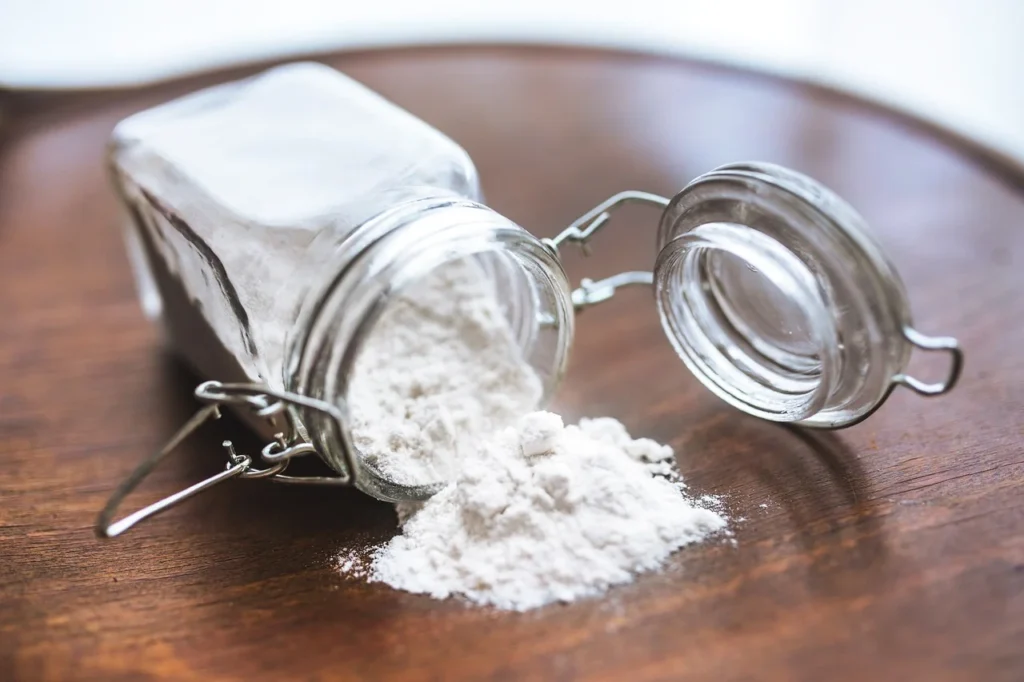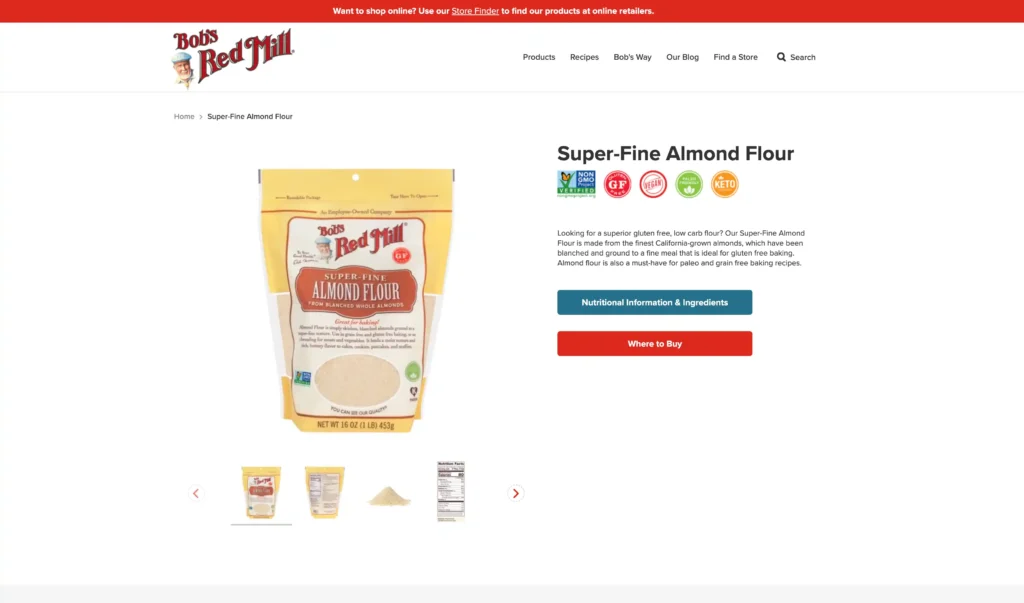Best Almond Flour for Macarons: Your Complete Guide
Perfect French macarons require more than just skill and practice. When things go wrong, bakers often blame their mixing technique or oven temperature.
But the real secret starts with your main ingredient: almond flour. While some brands sell “almond flour” that’s really just ground almonds, high-quality almond flour makes the difference between bakery-worthy macarons and flat, cracked disappointments.
In this guide, we’ll help you choose the best almond flour for macarons to help you consistently create good French macaron batter every time.
Contents
Why Almond Flour Matters for Macarons
Basic baking equals basic flour, but perfect baking requires the perfect ingredients, and flour has a lot more effect on the final result than you think:
The Base of Perfect French Macarons
Almond flour creates the heart of every French macaron. When mixed with powdered sugar and egg whites, it produces the classic texture everyone loves: crispy shells with soft, chewy centers.
Some bakers make their own almond flour at home, but this rarely matches the quality needed for a perfect macaron recipe.
The quality of your almond flour affects every part of your macaron batter. A small flaw in the flour can ruin an entire batch, even if you follow the recipe perfectly.
Understanding how almond flour works helps you create flawless macarons, whether you’re making classic vanilla shells or adding cocoa powder for chocolate varieties.
Texture: The Key to Smooth Shells

Texture makes a huge difference in your macaron results. Professional-quality macarons need superfine almond flour for smooth, crack-free shells.
Coarse flour turns your macaron batter lumpy and creates uneven tops that look homemade. The smoother your almond flour, the more polished your macarons will look.
Moisture Content and Perfect Structure
Moisture levels in almond flour can destroy your macarons. The extra moisture creates problems like soft shells, missing “feet” (those ruffled edges at the bottom), and centers that stick to your teeth like almond butter.
Quality almond flour feels completely dry when you touch it.
Natural Fats and Rich Flavor
The natural fats in almonds serve an essential purpose. These oils help create the right texture and make your macarons taste rich.
Some companies remove these oils to make “defatted” almond flour, but this ruins the delicate balance of your macaron batter. You want flour with its natural oils intact for the best results.
Why Blanched Flour Matters
Professional bakers choose blanched almond flour, made from almonds without their brown skins. Almond skins create dark spots in your shells and make the color uneven.
They also make it harder to achieve that perfect smooth texture that French macarons need. Blanched flour helps you create clean, professional macarons that look like they came from a Parisian bakery.
Types of Almond Flour

It’s not just about the moisture content, fat content, and flavor; the type of flour matters as well.
Blanched vs. Unblanched Almond Flour
French macaron recipes succeed or fail based on your choice of almond flour. Blanched almond flour, made from almonds without skins, creates beautiful shells that you can color perfectly with powdered food coloring.
This flour blends smoothly with sugar and egg whites to make a flawless macaron batter.
Unblanched flour includes bits of almond skin that show up as brown specks in your macaron shells. These specks not only affect how your macarons look on the baking sheets but also make it harder to achieve bright colors with food coloring.
Professional bakers avoid unblanched flour because perfect macarons need a clean, uniform appearance.
The Difference Between Superfine and Regular Almond Flour
Superfine almond flour consists of finely ground almonds processed until they reach an almost powdery state.
This flour feels as fine as wheat flour when you touch it. When making macarons, superfine flour creates shells that look smooth and glossy on parchment paper before they even go into the oven.
Regular ground almonds or almond meal has a texture closer to cornmeal. This coarseness creates problems in your macaron batter.
The larger particles prevent your shells from developing that signature smooth top, no matter how carefully you follow the recipe. Some bakers try to fix this using egg white powder, but the texture issues usually remain.
Store-Bought vs. Homemade Options
Commercial almond flour offers a consistency that’s hard to match at home. Every bag produces the same reliable results, which matters when you’re making macarons regularly. The industrial grinding process creates uniformly fine particles that work perfectly in macaron shells.
Many bakers try making almond flour in their food processor to save money. However, even the best food processor struggles to create particles fine enough for perfect macarons.
The flour often comes out uneven, with some pieces much larger than others. While sifting helps remove bigger pieces, you’ll still notice a difference in your final results.
If you still want to try grinding your own almonds, you’ll need to:
- Pulse small batches in your food processor
- Sift through a fine mesh several times
- Process any larger pieces again
- Keep sifting until no large particles remain
Most serious macaron bakers eventually switch to store-bought flour. The consistent results and time saved usually justify the extra cost, especially when you’re aiming for professional-quality shells.
Top Almond Flour Recommendations
Here are the top almond flour selections in the market right now:
1. Blue Diamond Almond Flour

This California-made flour comes from blanched almonds ground to a superfine texture that works beautifully in macaron shells.
The fine grind helps your macaron batter reach the right consistency for smooth, professional-looking results. Your macarons will develop proper feet and crack-free tops when you use this flour.
Blue Diamond sells their almond flour in different sizes. A 3-pound bag costs around $$11.48, while smaller 1-pound bags sell for about $9.98. The larger bag saves you money if you make macarons often.
What You’ll Love
The flour blends smoothly into your egg whites and sugar mixture. It creates consistent results across multiple batches of macarons. The quality matches what professional bakeries use.
2. Bob’s Red Mill Super-Fine Almond Flour

Bob’s Red Mill creates their almond flour through careful grinding and sifting processes. The result gives you an exceptionally fine texture that professional macaron bakers look for. When you spread your macaron batter on parchment paper, it smooths out perfectly without lumps.
A 16-ounce bag typically costs $31.96. This price reflects the careful processing needed to achieve such a fine grind.
What You’ll Love
Every bag maintains the same high quality. The flour carries gluten-free certification, making it safe for people with celiac disease. The superfine texture ensures your macarons look like they came from a French patisserie.
3. King Arthur Almond Flour

King Arthur sources their almonds from American farms and grinds them to a consistently fine texture. Their careful quality control means you can count on the same results every time you make macarons.
The flour works well, whether you’re making classic shells or adding food coloring for vibrant variations.
Most stores sell King Arthur almond flour for about $25.58 per pound. The quality justifies this premium price point.
What You’ll Love
The flour performs reliably in every batch. It creates smooth macaron shells that develop proper feet. The quality control ensures no coarse pieces sneak into your batter.
Closing Thoughts
Your almond flour choice directly impacts your macarons’ success. The right flour creates shells with smooth tops, ruffled feet, and the perfect texture.
While it might cost more than standard baking ingredients, quality almond flour saves you time, ingredients, and frustration in the long run.
Now you know what to look for and which brands to trust. With the right almond flour in your kitchen, you’re ready to create macarons that look and taste like they came from a French patisserie.

